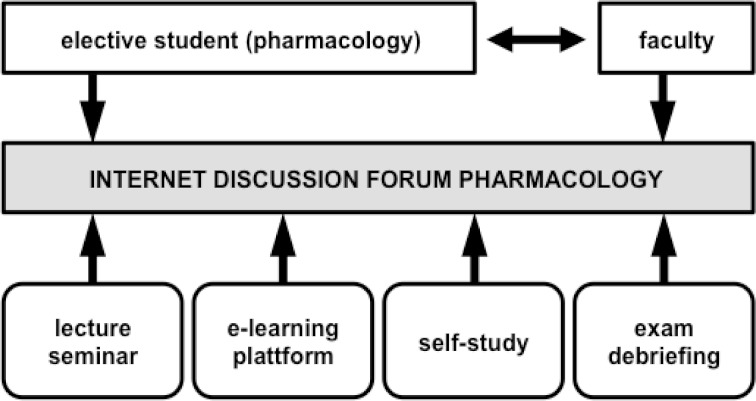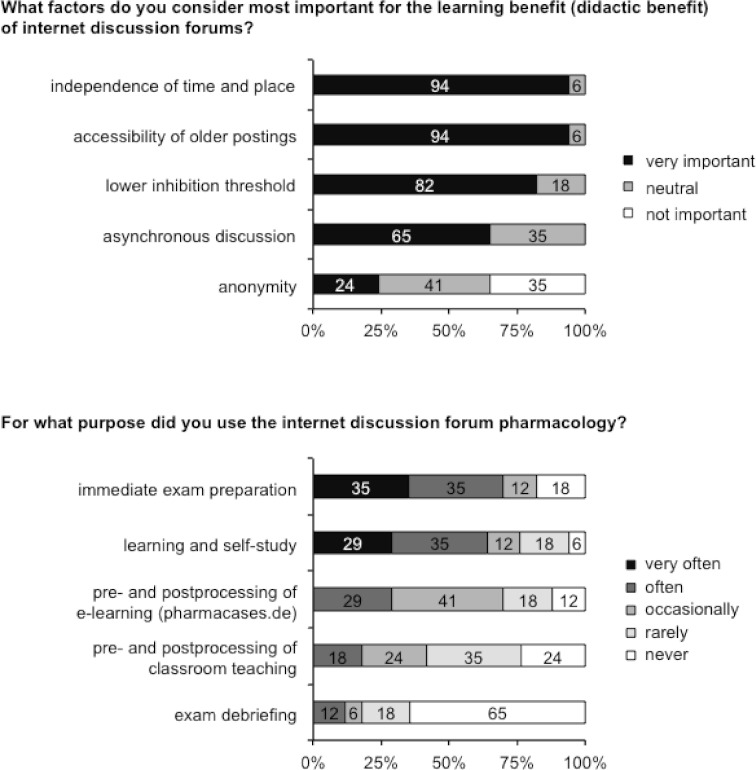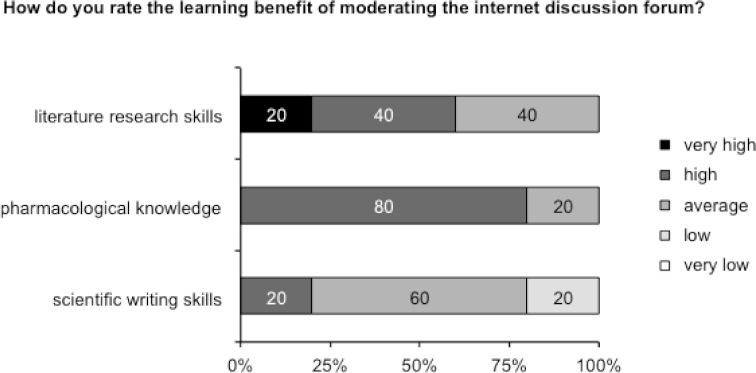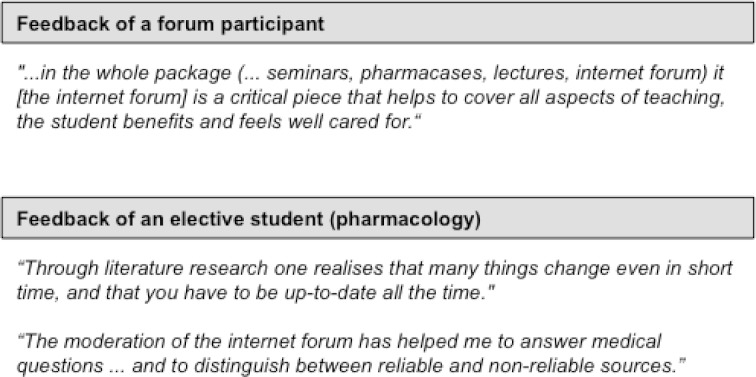Abstract
Introduction: The world wide web opens up new opportunities to interconnect electronic and classroom teaching and to promote active student participation. In this project article we describe the use of internet discussion forums as part of a student-centred teaching concept of pharmacology and discuss its advantages and disadvantages based on evaluation data and current literature.
Methods and Results: Final year medical students at the Technische Universität München (Munich, Germany) with the elective pharmacology moderated an internet forum that allowed all students to discuss pharmacology-related questions. Evaluation results of forum participants and elective students demonstrated a learning benefit of internet forums in pharmacology teaching.
Conclusion: Internet discussion forums offer an easy-to-implement and effective way to actively engage students and increase the learning benefit of electronic and classroom teaching in pharmacology.
Keywords: web 2.0, peer teaching, e-learning, pharmacology, internet discussion forum
Abstract
Einleitung und Ziele: Das World Wide Web eröffnet neue Möglichkeiten, Online- und Präsenzlehre zu vernetzen und Studierende aktiv in die Lehre einzubinden. In dieser Projektvorstellung beschreiben wir den Einsatz von Internet-Diskussionsforen als Teil eines studentenzentrierten Lehrkonzepts in der Pharmakologie und diskutieren Vor- und Nachteile anhand von Evaluations- und Literaturdaten.
Methode und Ergebnisse: Studierende im praktischen Jahr (PJ) mit Wahlfach Pharmakologie übernahmen die Moderation eines Internetforums, das allen Studierenden die zeit- und ortsunabhängige Diskussion pharmakologischer Fragen aus Online- und Präsenzlehre ermöglichte. Evaluationsergebnisse von Forumsteilnehmern und PJ-Studierenden belegten den didaktischen Nutzen von Internetforen für die Pharmakologieausbildung.
Schlussfolgerung: Internet-Diskussionsforen bieten eine effektive Möglichkeit, Studierende aktiv in die Lehre einzubinden und den Lernerfolg von Online- und Präsenzlehre zu fördern.
Introduction
The increasing prevalence of the internet and computer-based technologies has led to a rapid growth of e-learning courses at medical schools [1]. New collaborative elements of the world wide web, such as wikis, blogs and internet forums, meet the learning preferences of the generation Y ("digital natives") [2] and open up interesting opportunities to intertwine electronic and classroom teaching and to actively engage students in teaching.
In this project article we report the successful use of a internet discussion forum as communicative interface in a student-centred teaching concept of pharmacology and discuss its advantages and disadvantages based on evaluation data and current literature.
Project description
Didactic concept and objectives
In the winter term 2010/11 a student-centred teaching concept was introduced by the Institute of Pharmacology and Toxicology of Technische Universität München (TUM) with the objective to engage and promote the theoretical and collaborative skills of medical students in teaching. For this purpose a peer teaching concept was implemented that is comprised of several layers [3], [4]: medical students in their final year with the elective pharmacology research and write e-learning cases on clinically relevant aspects of pharmacology and toxicology. If needed, specialist expertise is sought by consultation of final year elective students of other disciplines (peer network). The so created e-learning material is made accessible to all students on the internet (http://www.pharmacases.de). A multi-step quality control by students (discussion within the peer network, online feedback) and faculty continuously reviews the content and actuality of the e-learning material.
To promote the discussion of pharmacology-related problems, a internet discussion forum was implemented in the website and moderated by final year medical students with the elective pharmacology. The main learning objectives for the elective students were to improve their pharmacological knowledge and literature research skills, and to develop collaborative skills that are required in interdisciplinary professional patient care, e.g. in consultations.
The internet forum was open to all students and faculty of TUM. As the primary collection point for subject-specific questions that originated in the classroom and e-learning courses of the Institute of Pharmacology and Toxicology, the forum served as a main communication interface between students, peers and faculty (see Figure 1 (Fig. 1)).
Figure 1. The internet discussion forum pharmacology serves as central communication interface between students, peers and faculty.
Implementation and content
Discussion forums are virtual rooms on the internet that enable the exchange of information and opinions [5]. In contrast to chatrooms, the flow of communication in forums is asynchronous, i.e. not in real-time.
The internet forum of pharmacology used the portal system myTUM/elevateIT of TUM, which is based on the open source products Zope (http://www.zope.org) and Plone (http://www.plone.org). The contributions ("postings") of the users in the forum were compiled in topics ("threads") and listed in chronological order.
The moderation of the forum and the literature research of queries were done by final year medical students at TUM with the elective pharmacology. For this purpose, the students received an introduction to literature research by faculty at the beginning of their elective. As prerequisite for publication in the forum, postings by the elective students were reviewed by the peer network or discussed with faculty. Upon publication in the forum, the postings could be commented and discussed by all forum participants.
Students were encouraged to post all questions that could not be addressed during the pharmacology lectures and seminars to the internet forum in a timely manner. Moreover, all e-learning cases were linked to the discussion forum. Starting in the winter term 2011/12, the after-exam debriefing by faculty was also exclusively conducted online in the internet forum.
User data and evaluation
The internet forum was accessed by 3945 visitors since its initiation on December 1st 2010, which corresponds to an average of 225 visitors per month. As of May 15th 2012 the forum contained 327 postings in 158 threads. 36.7% of all postings were done by students of the first to third year of medical school at TUM (third to fifth year of study), 45.9% by final year students with the elective pharmacology, and 17.4% by faculty. The number of postings per user ranged from one to 23 (mean 2.4).
60% of the elective students researched and answered more than ten queries during their 16-week elective in pharmacology. The time spent on answering one posting ranged from 16 to 60 minutes.
Evaluation
To determine the learning benefit of the internet forum for pharmacology training and student perception, a online survey among active forum participants (students in the first to third year of medical school) and pharmacology elective students was conducted. For data acquisition and analysis Google Docs & Spreadsheets (http://docs.google.com) software was used. 17 of 50 active forum participants (34%) and 5 of 6 pharmacology elective students (80%) participated in the survey.
The majority of the active forum participants considered the learning benefit of the internet forum as "high" (47%) or "very high" (24%) for their pharmacology training. Independence of time and place (94%), the ability to access older postings and discussions (94%) and a lower inhibition threshold for asking questions when compared to the classroom setting (82%) were named as most important advantages of internet forums (see Figure 2 (Fig. 2)). Most students used the forum particularly in learning phases, during self-study and for immediate exam preparation (see Figure 2 (Fig. 2)).
Figure 2. Evaluation results of active forum participants (n=17).
65% of the forum participants were “satisfied” or “very satisfied” with the answers and comments by the pharmacology elective students, and 88% would endorse a similar internet forum also for other disciplines. Representative comments by the forum participants stated that the forum fitted well into the overall concept of a combined classroom teaching and e-learning concept of pharmacology (see Figure 4).
The elective students stated that the discussion of pharmacology-related postings in the internet forum resulted in a high personal learning benefit (see Figure 3 (Fig. 3)) and the majority (80%) endorsed moderation of internet forums as part of their pharmacology training. A high learning benefit through forum moderation was stated for acquisition of pharmacological knowledge (80%) and literature research skills (60% "high" or "very high"). In contrast, the improvement of scientific writing skills played only a minor role (see Figure 3 (Fig. 3)). Representative free text comments of elective students are shown in Figure 4 (Fig. 4).
Figure 3. Evaluation results of pharmacology elective students (n=5).
Figure 4. Representative free text comments of forum participants and elective students.
Discussion
Although internet forums exist since the early 1990s [5], their use and didactic potential in undergraduate medical education has only been the addressed by few studies and reports [6]. Temporal and spatial flexibility of communication and the permanence of postings were suggested as advantages of internet forums, which might promote in-depth discussion and reflection [6], [7]. Another argument, which was also stated in the present survey by a majority of the students, is the lower inhibition threshold in internet forums for asking questions when compared to the classroom setting. This "online disinhibition effect" [8] might enable more reserved students to actively participate in discussions thereby promoting a "egalitarian learning environment" [6].
A common problem of internet forums is the low number of participants and their often high passiveness [9]. For an lively discussion culture a "critical mass" of active members is required, which in an university setting can often only fostered through time-consuming moderation by faculty [6], [10], [11].
The use of elective students as peer teachers presents a practical alternative with high didactic value and fosters the active participation of students with different skill levels in subject-specific discussions. Compared to faculty teaching, the smaller cognitive distance in peer teaching was shown to stimulate active involvement and intrinsic motivation [12]. The frequently expressed concern that student teaching is inferior when compared to faculty teaching was not confirmed in recent studies [13], [14]. The high degree of satisfaction of the forum participants with the support and answers from elective students (see Figure 3 (Fig. 3)) is in line with these findings. Further studies have to investigate if the evaluation results of the forum participants correlate with a quantifiable improved learning outcome.
Conclusion
Internet discussion forums are an easy-to-implement and didactically valuable supplement to classroom and electronic teaching concepts in pharmacology. They enable, particularly in a peer-teaching context, the active participation of students in teaching and thus are likely to improve the learning outcome of students.
Competing interests
The authors declare that they have no competing interests.
References
- 1.Fischer MR. E-learning in medical education, graduate and continuing medical education. Status and prospects. Med Klin (Munich) 2003;98(10):594–597. doi: 10.1007/s00063-003-1302-9. Available from: http://dx.doi.org/10.1007/s00063-003-1302-9. [DOI] [PubMed] [Google Scholar]
- 2.Junco R, Mastrodicasa J. National Association of Student Personnel Administrators (U.S.). Connecting to the Net.generation: What Higher Education Professionals Need to Know about Today's Students. Washington/DC: NASPA, Student Affairs Administrators in Higher Education; 2007. [Google Scholar]
- 3.Huwendiek S, Fischer MR. Preisträger des "GMA-Preis für junge Lehrende 2011" ausgezeichnet und Ausschreibung des GMA-Preis für Junge Lehrende 2012. GMS Z Med Ausbild. 2011;28(4):Doc49. doi: 10.3205/zma000761. Available from: http://dx.doi.org/10.3205/zma000761. [DOI] [Google Scholar]
- 4.Zollner B, Sucha M, Berg C, Muß N, Amann P, Amann-Neher B, Oestreicher D, Engelhardt S, Sarikas A. Pharmacases.de - A student-centered e-learning project of clinical pharmacology. Med Teach. 2013;34:1–3. doi: 10.3109/0142159X.2013.759642. Available from: http://dx.doi.org/10.3109/0142159X.2013.759642. [DOI] [PubMed] [Google Scholar]
- 5.Plant R. Online communities. Technol Soc. 2004;26:51–65. doi: 10.1016/j.techsoc.2003.10.005. Available from: http://dx.doi.org/10.1016/j.techsoc.2003.10.005. [DOI] [Google Scholar]
- 6.Taradi SK, Taradi M. Expanding the traditional physiology class with asynchronous online discussions and collaborative projects. Adv Physiol Educ. 2004;28(1-4):73–78. doi: 10.1152/advan.00017.2003. Available from: http://dx.doi.org/10.1152/advan.00017.2003. [DOI] [PubMed] [Google Scholar]
- 7.Hron A, Friedrich HF. A review of web-based collaborative learning: factors beyond technology. J Comput Assist Learn. 2003;19:70–79. doi: 10.1046/j.0266-4909.2002.00007.x. Available from: http://dx.doi.org/10.1046/j.0266-4909.2002.00007.x. [DOI] [Google Scholar]
- 8.Suler J. The online disinhibition effect. Cyberpsychol Behav. 2004;7(3):321–326. doi: 10.1089/1094931041291295. Available from: http://dx.doi.org/10.1089/1094931041291295. [DOI] [PubMed] [Google Scholar]
- 9.McKenzie WA, Murphy D. 'I Hope This Goes Somewhere': Evaluation of an Online Discussion Group. Aust J Educ Tech. 2000;16:239–257. [Google Scholar]
- 10.Barab SA, Duffy TM. From practice fields to communities of practice. In: Jonassen DH, Land SM, editors. Theoretical Foundations of Learning Environments. Mahwah/NJ: Lawrence Erlbaum; 2000. pp. 25–55. [Google Scholar]
- 11.Collis B, Nijhuis GG. The instructor as manager: Time and task. Internet Higher Educ. 2000;3:75–97. doi: 10.1016/S1096-7516(00)00034-8. Available from: http://dx.doi.org/10.1016/S1096-7516(00)00034-8. [DOI] [Google Scholar]
- 12.Ten Cate O, Durning S. Peer teaching in medical education: twelve reasons to move from theory to practice. Med Teach. 2007;29(6):591–599. doi: 10.1080/01421590701606799. Available from: http://dx.doi.org/10.1080/01421590701606799. [DOI] [PubMed] [Google Scholar]
- 13.Tolsgaard MG, Gustafsson A, Rasmussen MB, Høiby P, Müller CG, Ringsted C. Student teachers can be as good as associate professors in teaching clinical skills. Med Teach. 2007;29(6):553–557. doi: 10.1080/01421590701682550. Available from: http://dx.doi.org/10.1080/01421590701682550. [DOI] [PubMed] [Google Scholar]
- 14.Burke J, Fayaz S, Graham K, Matthew R, Field M. Peer-assisted learning in the acquisition of clinical skills: a supplementary approach to musculoskeletal system training. Med Teach. 2007;29(6):577–582. doi: 10.1080/01421590701469867. Available from: http://dx.doi.org/10.1080/01421590701469867. [DOI] [PubMed] [Google Scholar]






